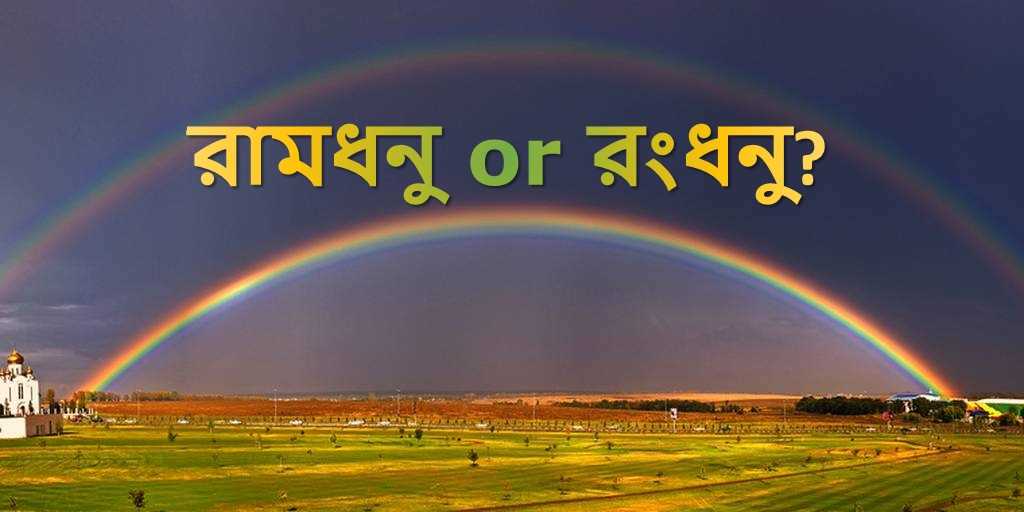The Bengali word for Rainbow has been changed. Henceforth, a rainbow in Bengali shall be known as ‘Rongdhonu (রংধনু)’, instead of Ramdhonu (রামধনু). A decision to change the word was taken in an attempt to secularize the language and the curriculum. The decision to re-christen Rainbow, also brings the West Bengali word closer to its Bangladeshi counterpart. Incidentally, there is no etymological basis to Rongdhonu.
While both West Bengal and Bangladesh speak and write in Bengali, there are marked differences in the language on both sides of the border. Some of these differences are historical. For instance, the standard Bengali dialect is assumed to be the one spoken around Kolkata, whereas regional dialects of Bengali were spoken in say, Dhaka, Sylhet, Chittagong etc. Other differences are religious or ideological. With the growth of a Muslim identity in East Bengal, some Bengali words were purged of their Hindu/Sanskrit past and were Islamized, so to speak. Therefore, Ramdhonu became Rongdhonu on the other side of the border. Instead of depending on merely Sanskrit as the base language for Bengali in the Eastern half of Bengal, word roots from Farsi and Arabi were selected.
For instance, Invitation became Davat (দাওয়াত) in Bangladesh, whereas Nimantran (নিমন্ত্রণ), remains the standard in West Bengal. Similarly, the word for sky in West Bengal is Aakash (আকাশ), whereas farsi influenced Aasman (আশমান) is prevalent in Bangladesh. Basically, language is, to put simply, a vehicle for carrying ideas of a culture. Indic culture has historically been carried by Sanskrit, its Prakrits and other languages, viz., those belonging to the Dravidian family. West Asian culture, on the other hand has been ferried by Arabic and Persian in modern times.
In that light, the change in Bengali word for Rainbow in West Bengal is significant. Is the government, as a matter of policy under the guise of Secularism, wanting to promote foreign cultures and uproot Indic culture?
The word Ram, in Ramdhonu, for instance, might remind a reader of Lord Ram and his mighty bow. In Hindi, the equivalent word is Indradhanush, which reminds the speaker of a God by the name of Indra. By choosing to replace, Ram with Rong, is the West Bengal government, secularizing education or curbing Indic culture?
By removing mention of Ram, the government is effectively breaking with Bengal’s glorious past. In the same breath, one must also note that the Bengali word for blue, Aakaashi, in a standard VII textbook has been replaced by Aasmaani. Once again, the translation of blue is closer to the Bangladeshi counterpart than what has historically been prevalent in West Bengal. Bengali, like many Indian languages, borrows heavily from Sanskrit- The so-called Tatsam words. Is the Government, now trying to replace these Tatsam words with Arabi and Farsi equivalents? Would it be acceptable to consider this change as merely Secularization? Or, is it a bigger Deculturization activity underway, at the end of which, a major cultural difference between Bengalis and Bangladeshis would be erased?
One would assume that Mamata Banerjee government is working on a multi-pronged strategy to change West Bengal, as it exists today. On one side is the unimpeded even encouraged movement of Bangladeshi Muslims into India. This helps alter the demographic ground reality. Bengali Hindus, who struggled for a homeland where they would be free from Islamic terror are today 70% of West Bengal’s population, down from nearly 80% at the time of independence. On the other hand, Mamata Bannerjee’s support for rabid Mullahs and Islamic obscurantists is encouraging riots and Communal disturbances, forcing Hindu Bengalis to flee their homes. And now, with this cultural assault on Bengali language, Mamata Bannerjee is effectively subverting the identity of Hindu Bengalis. Conspiracy theorists would point to the Greater Bangladesh theory to buttress their claims.
May be in a few years’ time, all Bengalis will ‘Paani Khabe’, instead of ‘Jol Khabe’ as is prevalent today. May be, Ganga will be a ‘Darya’, rather than a ‘Nodi’. Heaven will be ‘Behesht’, instead of ‘Shorgo’and hell will be Dozakh instead of ‘Paataal’. By cutting Bengali off its Sanskrit and Indic roots, Bengali will become more and more Persianized and Arabized, becoming similar in someways to Urdu. However, the beauty of the language will be lost forever and the culture associated with it will perish. Certainly, this was one Poriborton, Mamata Banerjee could have avoided. By mixing politics with language and culture, she is doing a great disservice to Bengalis.
